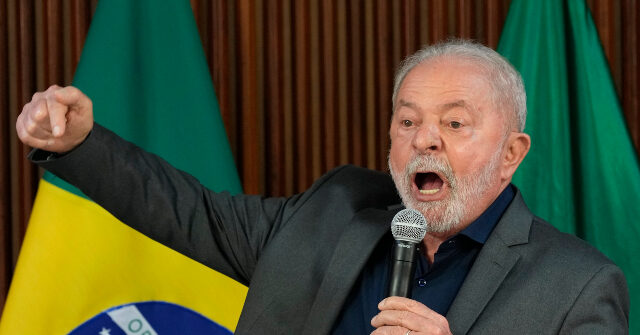Socialist President of Brazil Luiz Inácio Lula da Silva told reporters in remarks on Tuesday that he had no intention of negotiating on trade with President Donald Trump following the imposition of a 50-percent tariff on his country, opting to contact Chinese communist dictator Xi Jinping instead.
Lula also bizarrely added that he would invite Trump to COP30, the United Nations’ annual climate alarmism conference, because he was interested in recruiting Trump to help fight alleged climate change. Brazil is hosting COP30 this year, a summit already facing controversy due to alleged price gouging by hotels in the host city of Belem.
President Trump launched an initiative in April to renegotiate the terms of every major trade relationship America maintains. While some nations – such as the United Kingdom, South Korea, and Indonesia – have successfully brokered new trade agreements, traditionally friendly Brazil has struggled to organize productive talks with the White House. Lula has a reputation for poor diplomacy skills and reportedly scared his officials with the possibility of starring in an embarrassing White House incident similar to that between Trump and Ukrainian President Volodymyr Zelensky this year, which resulted in Trump kicked Zelensky out of the presidential residence. The Brazilian chief executive has not spoken directly to Trump or scheduled any meaningful trade talks with the president.
Addressing his lack of initiative in seeking talks with Trump, Lula told reporters on Tuesday he was not interested in trade talks, despite the devastating potential of the 50-percent tariff.
“I am not going to call Trump to do business, no,” Lula was quoted as saying, “because he does not want to talk. But I will call Trump to convince him to come to COP[30], because I want to know what he thinks of the climate issue.”
Instead of negotiating with Trump, Lula said, “I will call Xi Jinping, I will call Prime Minister [Narendra] Modi. I won’t call [Vladimir] Putin because Putin can’t travel.”
Xi, Indian Prime Minister Modi, and Russian strongman Vladimir Putin, alongside Lula, comprise the majority of the leadership of BRICS, an anti-American security and trade bloc whose aim is to erode American influence abroad and strengthen the global clout of its member nations. The four leaders make up the first four letters of BRICS; South African President Cyril Ramaphosa completes the core of the organization. BRICS has recently added five more members: Egypt, Ethiopia, Iran, the United Arab Emirates (UAE), and Indonesia, as well as a host of impoverished dictatorships as BRICS “partners.”
Putin’s travel limitations, as referenced by Lula, are due to the International Criminal Court (ICC) issuing an arrest warrant for him on charges of war crimes in the ongoing invasion of Ukraine.
On Tuesday, Lula reportedly insisted that Trump “doesn’t want to talk” and that he would “use every tool at our disposal to defend our economy” – apparently with the exception of calling the American president. Turning to BRICS during a tense time for American-Brazilian relations is unlikely to warm Trump to the idea of initiating a call with Lula, as the American president made clear even before being sworn in for a second term in office that he was focused on ensuring BRICS’s objective of undermining America was unsuccessful.
In November, shortly after his election, Trump posted a message on his website Truth Social in which he threatened tariffs as high as 100 percent on BRICS countries if they move forward with attempting to establish a regional BRICS currency, a plan most enthusiastically supported by Lula.
“The idea that the BRICS Countries are trying to move away from the Dollar while we stand by and watch is OVER,” Trump wrote at the time. “We require a commitment from these Countries that they will neither create a new BRICS Currency, nor back any other Currency to replace the mighty U.S. Dollar or, they will face 100% Tariffs, and should expect to say goodbye to selling into the wonderful U.S. Economy.”
Trump expanded that threat in July, declaring, “any Country aligning themselves with the Anti-American policies of BRICS, will be charged an ADDITIONAL 10% Tariff.”
Lula has repeatedly called for the establishment of some alternative currency to topple the dollar. At the BRICS forum, he has championed a BRICS-backed currency. BRICS has already established an investment bank to compete with the World Bank and International Monetary Fund (IMF), led by Lula’s protege Dilma Rousseff.
“Why can’t an institution like the BRICS bank have a currency to finance trade relations between Brazil and China, between Brazil and all the other BRICS countries?” socialist Brazilian President Luiz Inácio Lula da Silva asked in April 2023. “Who decided that the dollar was the currency (for trade) after the end of the gold parity?”
Lula has also proposed a regional South American currency called the “sur,” but no concrete plans for its establishment have ever materialized.
Independent of Trump’s remarks on BRICS, the American president declared Brazil itself a threat to the national security of the United States last week in an executive order imposing a 50-percent tariff on the country’s exports to America. Trump cited Lula’s leadership in persecuting conservative voices in the country, censorship of American-owned social media platforms, and the prosecution of conservative former President Jair Bolsonaro for his measures.
“Recent policies, practices, and actions of the Government of Brazil threaten the national security, foreign policy, and economy of the United States,” Trump wrote. “These judicial actions, taken under the pretext of combatting ‘disinformation,’ ‘fake news,’ or ‘anti-democratic’ or ‘hateful’ content, endanger the economy of the United States by tyrannically and arbitrarily coercing United States companies to censor political speech.”
Follow Frances Martel on Facebook and Twitter.
Read the full article here


